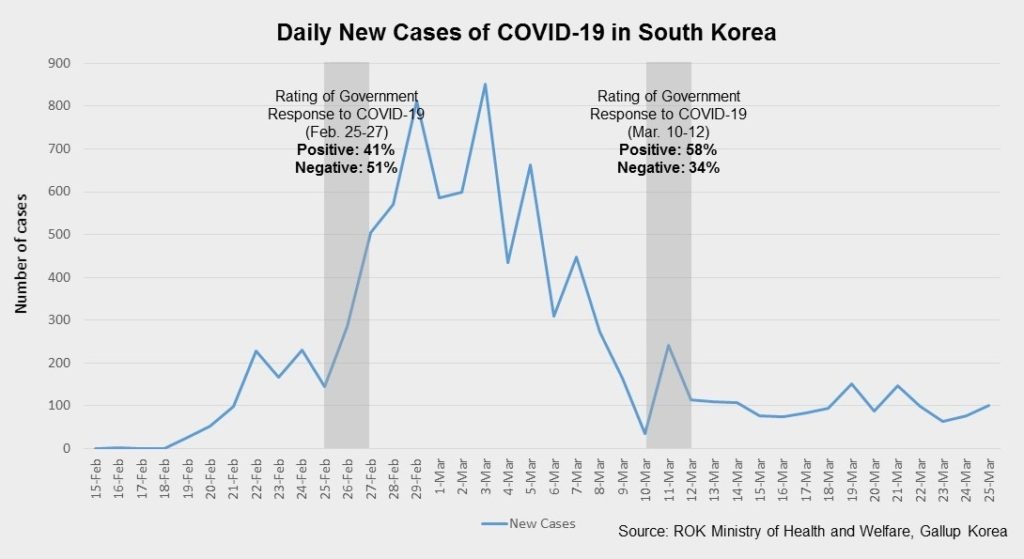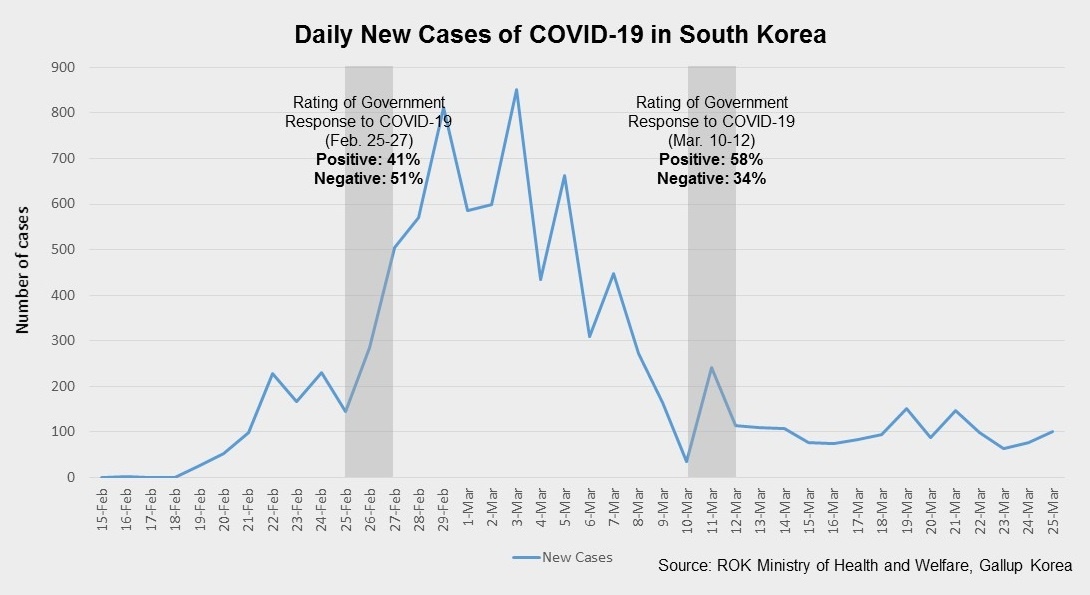The Peninsula
How South Koreans view Their Government’s COVID-19 Response

By Juni Kim
While much of the world is grappling with the escalating COVID-19 crisis, South Korea has received glowing international media coverage for its domestic campaign to contain the virus and to reduce its death toll. News headlines like “Why South Korea’s COVID-19 strategy is working,” “South Korea shows that democracies can succeed against the coronavirus,” and “How South Korea Flattened the Curve” hold up South Korea as a model to follow in fighting the virus’s spread. In a March 23rd article, The New York Times stated “No matter how you look at the numbers, one country stands out from the rest: South Korea.” World Health Organization (WHO) Director-General Tedros Adhanom Ghebreyesus praised South Korea’s efforts last week saying “WHO is working in solidarity with other countries with community transmission to apply the lessons learned in Korea and elsewhere, and adapt them to the local context.”
However, South Koreans have had a more mixed opinion of their government’s COVID-19 response. According to Gallup Korea, overall approval of the government’s containment efforts was reported at 58% for polling conducted on March 10th to the 12th, with 41% of survey respondents expressing disapproval. This is a marked improvement compared to an earlier poll conducted on February 25th to the 27th when approval was at 41% and disapproval at 51%. The February poll was conducted during South Korea’s period of rapidly escalating daily cases.

The difference in approval is largely split along political lines. In the March Gallup Korea poll, approval among respondents that identified with the progressive Democratic Party of Korea (DPK), the party of South Korean president Moon Jae-in, was at 86%. Conversely, respondents that identified with the conservative United Future Party (UFP) polled 22% approval. The February poll also had a partisan split, though with overall lower approval ratings, with 71% approval for DPK respondents and 8% approval for UFP respondents. It is also worth noting that President Moon’s approval ratings over the past two months remain similar to his approval ratings prior to the outbreak. While recent polls suggest a slight uptick in approval (the latest Gallup Korea poll shows his approval at 49%), he has generally polled in the mid-40% range both before and during the crisis. His approval is also sharply divided along party affiliation, with the latest poll indicating 89% approval among DPK respondents and only 7% among UFP respondents.
Justin Fendos, a professor at Dongseo University, has negatively remarked on the politicization of the COVID-19 crisis in South Korea. Writing in a March 10th article for The Diplomat, he stated “I am extremely disappointed by this politicization of the outbreak. I can say with some authority that the negative coverage has started to make my job, and the jobs of my many colleagues, more difficult.” According to Fendos, many elderly South Koreans, who are more likely to be affiliated with the UFP and are also the most vulnerable demographic to the virus, have questioned or dismissed the government’s social distancing and containment protocols. If public trust in the government falters, residents may feel less inclined to comply with government advisories, which may introduce new opportunities for COVID-19 to spread. For instance, several churches in South Korea have continued to hold physical gatherings despite authorities calling for social distancing, with one church congregation seeing an outbreak of 52 infections and another clashing with police officers.
With legislative elections scheduled to take place on April 15th in South Korea, the partisan divide will likely be further exacerbated as politicians tussle over gaining votes. While such divisions are to be expected during an election year, the COVID-19 crisis adds a complicating dimension to the election run-up. Politicians on both sides should be wary of the potential spread of misinformation that runs counter to fact-based public health recommendations. With many Western nations looking to South Korea for lessons, another one to watch for is how South Korea continues to handle the health crisis while coping with political divisions and upcoming elections.
Juni Kim is the Senior Manager for Operations and Technology at the Korea Economic Institute of America (KEI). The views expressed here are the author’s alone. Graphics by Juni Kim. Research assistance provided by Park Ingyeong and Jang Hyungim, Interns at the Korea Economic Institute of America.
Photo from the Republic of Korea’s photostream on flickr Creative Commons.
